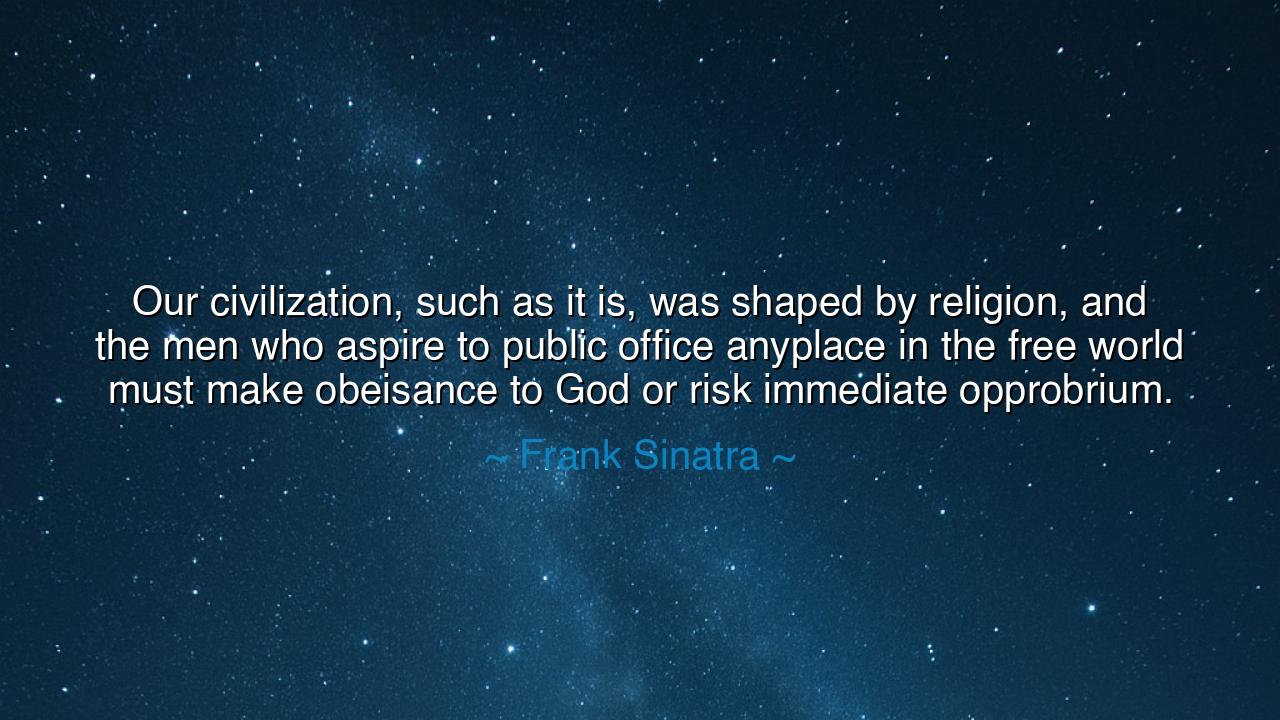
Our civilization, such as it is, was shaped by religion, and the
Our civilization, such as it is, was shaped by religion, and the men who aspire to public office anyplace in the free world must make obeisance to God or risk immediate opprobrium.






In the age-old march of human history, where the tapestry of civilization is woven with the threads of culture, values, and beliefs, Frank Sinatra’s words carry a deep reflection on the relationship between religion and the formation of society: "Our civilization, such as it is, was shaped by religion, and the men who aspire to public office anyplace in the free world must make obeisance to God or risk immediate opprobrium." These words call us to recognize the profound influence that religion has had on shaping civilization, not only as a spiritual force but as a moral foundation upon which societies have built their laws, customs, and cultures. From the dawn of recorded history, religion has been a guiding force for human action, and those who seek leadership within a society are often required, whether through personal belief or public display, to show reverence to the divine.
At the heart of this assertion lies the recognition that religion has been, and continues to be, a cornerstone of human society, shaping both individual lives and the social order. The ancient Greeks and Romans built their temples and conducted their sacrifices as part of the social fabric, understanding that the favor of the gods was crucial to the prosperity and well-being of the state. The Judeo-Christian tradition, which has profoundly influenced Western civilization, emphasized not only personal piety but the establishment of moral codes that were to guide the conduct of individuals and leaders alike. The Ten Commandments, as an example, offered a foundation for not only personal ethics but societal laws, framing the relationship between the individual and the divine as foundational to justice, truth, and order.
In more recent history, the connection between religion and political power is still apparent. Consider the example of Abraham Lincoln, whose speeches and actions were deeply infused with Christian values. Lincoln’s personal faith, though not publicly outspoken, informed his leadership, particularly in his moral resolve to end slavery and preserve the union. His words and actions resonated with the moral compass provided by Christian doctrine, such as the imperative to "love thy neighbor," which he saw as central to the American experiment. Lincoln understood that religion was not only a private affair but a public moral force that shaped national policy and direction. His appeal to God during the American Civil War helped frame the conflict in moral terms, making the fight for liberty and equality a battle for divine justice.
Sinatra’s words also reflect the social contract of modern democracies, where the public demands certain moral assurances from their leaders. The expectation that those who hold power must show some form of reverence to God is deeply ingrained in the cultural and political structure of the free world. A politician who openly rejects the notion of God or expresses atheism risks alienating the masses, as public office requires more than just a demonstration of political competence—it demands a moral alignment with the values of the people. In countries like the United States, where freedom of religion is enshrined, the public still expects its leaders to at least acknowledge divine authority and to invoke God in times of national crisis or decision-making, signaling to the populace that their leaders are morally grounded in something greater than human will.
However, the expectation of religious obeisance from those in public office is not a modern phenomenon. Consider the role of kings and empires throughout history, where rulers were often seen as divinely appointed. The ancient Pharaohs of Egypt, for instance, ruled not only as political leaders but as living gods. Their authority was grounded in divine sanction, and any challenge to their rule was seen as a challenge to the will of the gods themselves. Similarly, in medieval Europe, the Catholic Church held immense power, with kings and queens often seeking the approval of the pope to legitimize their reigns. This fusion of religion and political authority reflects the ancient belief that true power stems from divine favor, and thus, public leaders must demonstrate their devotion to God.
The lesson in Sinatra’s words speaks not only to the historical connection between religion and power, but to the ongoing need for moral clarity in leadership. Religion, in its highest sense, provides the moral foundation for leaders to act with integrity, wisdom, and compassion. It is not the outward act of religious obeisance that matters most, but the inner conviction that drives a leader to serve with the greater good in mind, following principles that transcend personal gain. Whether one follows Christianity, Judaism, Islam, or any other faith, the core values of compassion, justice, and truth can guide any leader toward fairness and equity for all.
In our own lives, we must take heed of the deep connection between ethics, religion, and leadership, even if we do not hold political office. The moral values we embody in our everyday actions—how we treat others, how we seek truth, how we stand for justice—are the reflection of the inner compass that guides us. Let us seek to cultivate this moral integrity in our own lives, acknowledging that leadership is not about power alone but about service, humility, and the guiding force of something greater than ourselves. Whether we are leading a community, a family, or simply living as individuals, let us align our actions with the core values that uplift and support the common good, just as religion has done throughout history.






AAdministratorAdministrator
Welcome, honored guests. Please leave a comment, we will respond soon